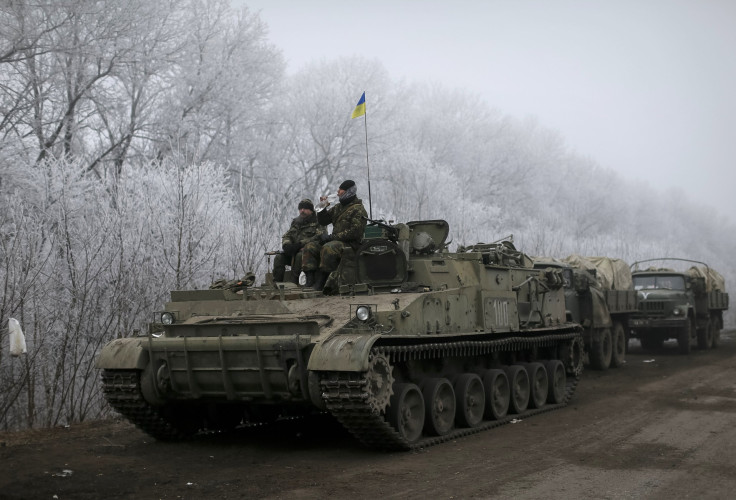Ukraine Ceasefire In Danger As Pro-Russian Rebels, Ukraine Military Fight For Debaltseve

UPDATE 6:15 p.m. EST: The U.S. State Department Monday confirmed Russian-backed separatists had violated the Ukraine ceasefire agreement at least 129 times in the past 24 hours. The State Department said in a press release there were five deaths and 25 injuries as a result of the ceasefire violations.
"The separatists have publicly declared that they refuse to observe the cease-fire in Debaltseve, and OSCE [Organization for Security and Co‑operation in Europe] monitors have not been provided security guarantees for access," the State Department said. "These aggressive actions and statements by the Russia-backed separatists threaten the most recent ceasefire and jeopardize the planned withdrawal of heavy weapons, as called for in the Feb. 12 Minsk packet of implementing measures."
The statement called on Russia and the rebels to end the attacks immediately and allow OSCE monitors into the area.
Original post:
Since the Ukraine ceasefire began at midnight, local time, Sunday, fighting in the east between pro-Russian rebels and the Ukrainian military has largely ceased -- with one exception: the city of Debaltseve. The strategically important city, a main transport hub into the contested regions of Donetsk and Luhansk, is besieged by separatist fighters, tanks and heavy artillery.
The four governments that brokered the deal -- Ukraine, Russia, France and Germany -- have not yet declared the ceasefire breached, but the continued fighting in Debaltseve does go against the Minsk Agreement, which was signed Feb. 12. The primary concern is the continued fighting in Debaltseve could be the spark that reignites fighting in other parts of eastern Ukraine and effectively ends the ceasefire.
Igor Sutyagin, a senior fellow and expert in Russian political and military affairs at the military think tank Royal United Service Institute in London, said while the ceasefire has clearly been broken, the official line will be decided politically.
“Only the political leaders in the West see Debaltseve as an exception to the ceasefire,” Sutyagin said. “They don’t want to admit that it’s already failed, in case fighting starts in the rest of the country. So it’s not broken unless they say it is.”
According to the Ukrainian government’s Anti-Terrorist Operation -- Kiev calls the Donetsk and Luhansk separatists "terrorists" -- there have been 112 attacks since Sunday by rebel forces, most in areas around Debaltseve, but there have also been reports of clashes in the port city of Mariupol. The rebels for their part have accused the Ukrainian military of shelling the Donetsk airport.
So far, the agreement to begin withdrawing heavy weapons from the front line has been ignored by both sides. Rebel commanders have said because the city of Debaltseve is encircled by separatist forces, it should be considered theirs. "Heavy weapons will be withdrawn if the Minsk accords are observed. Those conditions are not in place yet," rebel defense spokesman Eduard Basurin said.
The Ukrainian military has said it will refuse to abide by the ceasefire agreement because rebels already violated it.
Meanwhile, new European Union sanctions went into effect Monday, mostly aimed at officials in the pro-Russian strongholds of Donetsk and Luhansk, but also included two Russian deputy defense ministers and Russian celebrity singer and Member of Parliament Joseph Kobzon, a native of the Donetsk region who is also a honorary consul for the self-proclaimed Donetsk People's Republic.
A Cossack formation was also targeted, along with other armed separatist groups. Members will now be subjected to visa bans and an asset freeze across Europe.
An EU official told the BBC the new sanctions were imposed because of a rocket attack that killed 30 people in Mariupol last month.
"The sanctions were meant to come into force last week, but they were postponed because the EU didn't want to
© Copyright IBTimes 2024. All rights reserved.






















